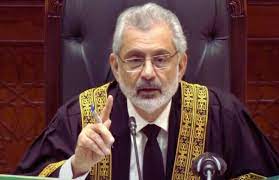F.P. Report
ISLAMABAD: Chief Justice of Pakistan (CJP) Qazi Faez Isa has said that access to information is a constitutional right of every citizen, and it is not just a matter of the court’s will. He further said that the Supreme Court was also subject to Article 19A of the Constitution. The CJP was addressing a training workshop for journalists reporting on the higher judiciary on Saturday.
He told the gathering that a committee was working to nominate judges for the judicial commission, adding that the goal was to appoint good judges who understood the law well. “Judges should not look at each other with suspicion, but understand that they have also come to lend a hand,” CJP Isa said, adding that efforts were being made to run the Supreme Judicial Council properly.
He said he had been told not to tell reporters what he had in his heart, adding that he was told that if he did so, everybody will write from the angle of their choice. “Truth is our salvation,” Justice Isa said, adding that the goal for every citizen should be truth, whether they agreed with someone or not. The CJP further said that the way to change the destiny of a country is to improve the quality of educational institutions. “In the Syndicate meeting of the Quaid-e-Azam University, it was ordered to restore student unions,” he revealed.
The CJP also said that important cases were being broadcast live so that people understood and raised questions. “People have the right to disagree,” he added. At the event, the CJP released the three-month performance report of the judiciary. “What could have been a better opportunity than this for us to start our accountability in front of journalists,” the CJP remarked, adding that information about the judiciary reached the public only through journalists.
He said two clauses of the Constitution related to the day’s ceremony were important, adding that Article 19 mentioned freedom of the press, while the second clause, Article 19A, was about the fundamental right of access to information. “As a citizen, it is your right to get any information,” he maintained, adding, “Now it is not our will.” He further said that it was the duty of the institutions subordinate to the federal government to provide any information demanded. “Every citizen can get information from the website of the Supreme Court. The effort is to settle more cases in less time, CJP Isa said, adding that this week, 504 cases were settled and 335 new cases filed.
A judge who is affected by social media, violates his oath: Supreme Court Justice Athar Minallah on Saturday said social media should not influence judges, adding that if a judge is affected by it then they are violating their oath.
Addressing the second law bridge workshop on superior court reporting at a private hotel in Islamabad, Justice Minallah said if even critics trusted the court then it was a test of the judiciary. Everyone should criticise, but also trust the judiciary, he maintained.
Referring to the lack of freedom of speech in the country, the top court judge said the endless process of censor kicked off after the state’s censoring Quaid-e-Azam Muhammad Ali Jinnah’s August 11, 1947 speech. Reminiscing his first case as a judge, he said it was a bail plea and a 16-year-old suspect was before the court for putting up a banner against an apex court judge. The subordinate court rejected the plea saying he had committed a crime against the entire judiciary, he said adding that nobody tried to find out who got the banners made.







